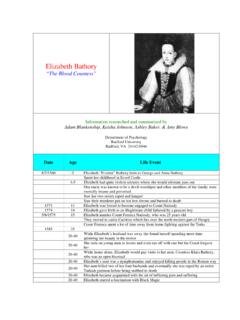Transcription of NCR Podcast: Interview with Elizabeth Johnson …
1 1 NCR Podcast: Interview with Elizabeth Johnson Host: Tom Fox Tom Fox: A sister in the congregation of St. Joseph who hails from Brooklyn, Elizabeth Johnson has been president of both the Catholic Theological Society of America and the American Theological Society. She has served as a member of the national Lutheran-Catholic Dialogue, a consultant to the Catholic Bishops Committee on Women in Church and Society, a theologian on the Vatican-sponsored dialogue between science and religion, and on the Vatican-sponsored study of Christ and the world s religions.
2 She is also the author of the much acclaimed She Who Is, as well as Truly Our Sister: A Theology of Mary in the Communion of Saints, Consider Jesus: Waves of Renewal in Christology, The Church Women Want, and Friends of God and Prophets. Today, Elizabeth Johnson is a distinguished professor of theology at Fordham University. Welcome, Elizabeth . Allow me to start where many people probably start when they talk to you about your book, and that is the bad press that God has been getting recently, and even you allude to it early on in your book.
3 Richard Dawkins, the author of The God Delusion is giving God a bad time. Is this deservedly so, given his arguments? Elizabeth Johnson : To talk about Dawkins, and also Hitchens, Harris, the others that are writing those kinds of books, simply gets me very frustrated because the God that they are denying existence to is not the God that most Christians even believe in. It s a mistake that they are starting out with, and then they deny up and down that this God in the sky, whom they imagine as an old, omnipotent man who intervenes in the world at will, to create evolutionary changes and things like that.
4 Then they say there is no such God, but Christians don t believe in God that way so it doesn t compute. Their argument doesn t go anywhere. If I may say, atheists of the 19th and early 20th Centuries offered really serious intellectual challenges to the faith. I m thinking if people hear the German philosopher Ludwig Feuerbach, Karl Marx, Friedrich Nietzsche, and Sigmund Freud in dialogue with those atheists and their attacks on God, theologians have benefited because we have gotten new angles of vision into God and new Interview with Elizabeth Johnson 2 ways of exploring who the living God is, new ways of bringing this to people.
5 These contemporary attacks, and they go by the name of the New Atheists , are very, very shallow and superficial. Truthfully for most theologians, there s nothing to chew on there. There s almost no way to have a dialogue with them because they re not even talking about the same thing. Tom Fox: Then let s talk about your God, the God that you describe in The Quest for the Living God. Start with the title why the living God? Elizabeth Johnson : I did not want to just keep saying God, God, God.
6 That summons up certain images to most people s minds and I was trying to expand what the reference of the word God means in most people s minds and hearts. The phrase the living God comes from the Bible. It s found in the Psalms and the prophets. It strikes me as a very wonderful, engaging, enticing adjective to describe God as alive, as on the move, as opening up a future, as full of beans, so to speak, as compared to the old, monarchical notion that is rather static.
7 In scripture, they often compare the living God to a spring of living water or a well where the water is running clear. Most times it connects with life, so the living God is the one who gives life, and all of the blooming, buzzing ideas that go with life are connected with that notion of God. So I was trying to make God seem interesting to people in general who think they know who God is, or they re told who God is, and it sort of shuts down then. Tom Fox: You deal with God as gracious mystery in your second chapter, but before that, you lay out three ground rules for the journey of this quest to recognize the living God.
8 Could you spell out those three ground rules? Elizabeth Johnson : The first one is that God is an ineffable, incomprehensible mystery and we can never wrap our minds around the fullness of who God is, simply by virtue of God being God and not a creature. The second rule is therefore, every word we use to speak about God has to be interpreted in a slanted direction. It s metaphorical, symbolic or analogical. It never means directly what we know it means in the world of creatures. It always means Interview with Elizabeth Johnson 3 that and more since God is the source of whatever it is we re saying about God.
9 Thirdly, therefore since no single name or word is ever sufficient, we need many words, many names, many images, many adjectives for God. Even added up all together, they wouldn t deliver the fullness of God, but each one adds to the richness and texture and the greatness of what we mean when we say that three-letter word, G-o-d. Tom Fox: When you speak about this living God, at the outset you quote the theologian Rahner and you write this: The whither of our self transcendence is that toward which we are journeying, the goal toward which our self-transcending minds and hearts are forever reaching.
10 Explain to us what you mean by the whither. Elizabeth Johnson : Like myself in a way, Karl Rahner was trying to avoid the word God because it seemed to settled and too narrow, in common usage, so he begins the notion of how we can come to understand a little bit about God by asking us to reflect on ourselves and our mental capacity for asking questions. As we get an answer, then we ask the next question and the next one. That is, in a sense, endless in us, the same with our hearts, our desire for love.









